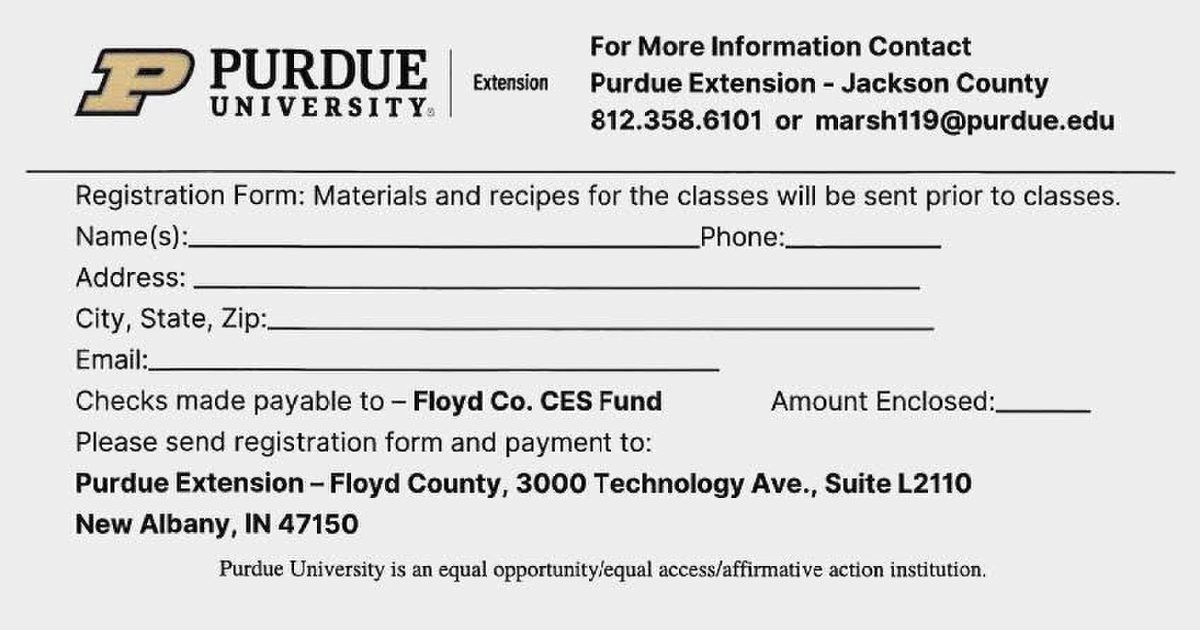
March is National Nutrition Month, an annual campaign created by the Academy of Nutrition and Dietetics.
This month, the public is encouraged to learn about making informed food choices and develop healthy eating and exercise habits.
To coincide with National Nutrition Month, an educational opportunity is available for anyone with diabetes and/or family members caring for those with the disease. Adults with Type 2 diabetes (or who are at risk) also are invited to attend.
[sc:text-divider text-divider-title=”Story continues below gallery” ]
“The Dining with Diabetes program is a positive and proactive approach in reducing the effects of diabetes,” said Molly Marshall, health and human science educator for Purdue Extension Jackson County.
Marshall said studies have shown with proper diet and consistent physical activity, Type 2 diabetes can be delayed, controlled or even prevented.
“This program is needed now more than ever and will continue to make an impact on the residents of Indiana,” she said. “Our area health and human science Purdue Extension educators will be presenting these classes.”
The virtually workshop will be conducted from 5:30 to 7:30 p.m. every week for four consecutive Tuesdays beginning April 6 via Zoom.
The cost is $10 per household if registered before March 19 or $15 if registered by March 30. Materials and recipes for the workshop will be sent prior to classes.
“The information presented will help persons with diabetes and their families in an effort to provide participants with tools needed for self-management of this chronic disease,” Marshall said.
The program will enable participants of Dining with Diabetes to equip themselves with knowledge and skills to improve their health or care for someone with diabetes.
Each class will feature food demonstrations, and recipes will be provided to participants.
“Recipes used in the classes take into account today’s busy lifestyle and have fewer and less-expensive ingredients and are prepared with less fat and sodium,” Marshall said.
The importance of fiber and calcium in meal planning also will be discussed, and each class is broken down into educational sessions that will feature recipes for meal planning.
Participants will be shown how to prepare healthy versions of familiar foods that are quick and easy to prepare, inexpensive and tasty.
“Physical activity is an important management tool for those with diabetes,” Marshall said. “We will discuss ways to increase physical activity as a component of controlling and preventing diabetes.”
According to the Centers for Disease Control and Prevention 2019 Diabetes Report Card, 10.4% of Indiana’s adults reported having been diagnosed with diabetes compared to the national average of 9.5%.
It also is estimated 6.4% of the adult population in Indiana has prediabetes, and diabetes was the seventh leading cause of death in the state in 2016.
Andi Bukowski, a registered dietitian and diabetes educator at Schneck Medical Center in Seymour, said diet is very important in preventing diabetes. Along with regular exercise and maintaining a healthy weight, it is the biggest tool in preventing Type 2 diabetes.
“I do not recommend skipping meals, but make sure you have a balanced diet and your portions are well controlled,” Bukowski said. “The best way to double-check this is to follow the MyPlate guidelines from the USDA (myplate.gov).”
She said exercise is very important in a healthy lifestyle, but it’s important to remember that it is almost impossible to “exercise off a bad diet.”
“Most Americans will overestimate how much they burn through exercise and then underestimate what they consume, which will likely result in weight gain,” Bukowski said.
She said exercise is still very important in maintaining a healthy weight and helping to stay healthy for a longer period of time.
All fruits contain natural sugar and are therefore considered a high-carbohydrate food, Bukowski said.
“Most vegetables will contain some carbs, but the majority of that will come from fiber, and they are still considered lower carb with the exception of the starchy vegetables,” she said. “These include potatoes, corn, peas and beans. These do contain higher amounts of starch and are considered higher carb foods.”
Still, Bukowski believes all vegetables and fruits are good for a balanced diet, and the most important part is portion size.
Including a variety of all fruits and vegetables in the ideal amount will help ensure a more balanced diet.
“I believe the best idea for managing Type 2 diabetes is to first get as much added sugar out of the diet, which is usually in the form of sugar-sweetened beverages, candy and sweets,” she said. “The next thing is to focus on learning the correct portion of all foods at meals, which is shown by the MyPlate method.”
[sc:pullout-title pullout-title=”If you go” ][sc:pullout-text-begin]
What: Dining with Diabetes workshop
Dates/topics:
April 6, What is Diabetes? – Snacks
April 13, Carbohydrates and Sweeteners – Special Occasions and Desserts
April 20, Fats and Sodium – Main Dishes
April 27, Putting it all Together – Side Dishes
Time: 5:30 to 7:30 p.m.
Location: Zoom (online)
Cost: $10 per household if registered before March 19, $15 if registered by March 30; materials and recipes for the workshop will be sent prior to classes
Registration form should include: Name, address, phone number and email along with a check made payable to Floyd County CES Fund; mail registration form and payment to Purdue Extension Floyd County, 3000 Technology Ave., Suite L2110, New Albany, IN 47150
Information: Molly Marshall at 812-358-6101 or [email protected]
[sc:pullout-text-end]
